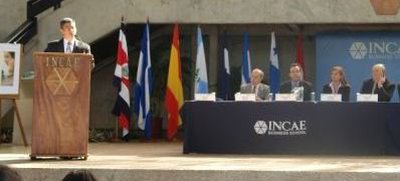4 Apr 2011
Second Module of the INCAE–WTI Regional Economic Integration Programme
With the aim of adding momentum to Central America’s economic integration, a key group of 60 private sector executives and government officials will join together this week for the second module of a Regional Integration Training Programme – an initiative co-sponsored by the World Bank and the Government of Spain and executed by INCAE Business School and the World Trade Institute to promote convergence of trade and other sectors in the region.
The Economic Regional Integration Programme (PIER, in Spanish), relates to several initiatives announced by World Bank President Robert B. Zoellick at the July 2010 Central American Presidential Summit to support the region’s integration bid.
The module will focus on Agriculture and Standards and will be held at the INCAE Business School Campus in Costa Rica. Agriculture is one of the most contentious issues in the trade policy arena. Central American countries with a significant comparative advantage in agriculture have to deal with the agriculture reforms resulting from WTO negotiations and commitments made in regional trade agreements as well as to navigate between complex offensive and defensive interests in the sector. They must also contend with agricultural regulations and other standards on goods impacting on trade in agricultural commodities in numerous ways. Such regulations can advance domestic social goals like public health by establishing minimum standards or prescribing legitimate, scientifically sound, safety requirements. But they can also serve as hidden protectionist policies.
The course will address fundamental issues of the Agriculture, TBT and SPS agreements of the WTO and their relationship with regional trade agreements and regional and national regulatory regimes. Current issues such as domestic support measures, GMOs and labelling will be analysed in both their global and regional contexts.
The course will be taught by Arthur Appleton (WTI), Alberto Trejos (INCAE), Bernard Kilian (INCAE), Fernando Piérola and Víctor Umaña (WTI–INCAE).


